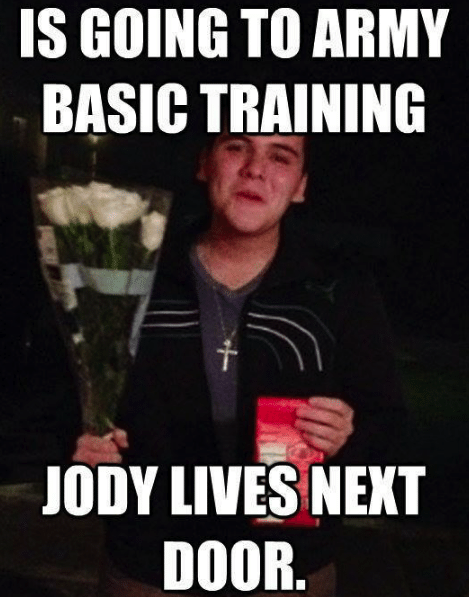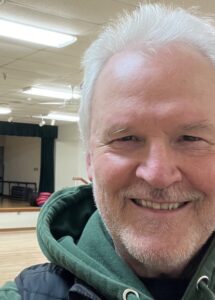After you’ve lived in a chain of command culture the picture clears up. It’s not about being over-burdened, neglected, or picked on.
It is about preparing to be a better link in the chain. Not exactly another brick in the wall, a chain is more active.
Or it’s preparation to leave the chain never to return to anything resembling command, following orders, or kowtowing to anyone.
Once you’ve been a link in the chain, you can see where it leads others.
I met a young soldier in the Receiving Depot just in from LA. We were all young soldiers at the time getting ready for who knew what.
All we did know was we were on base on a Friday night with a few men screaming us off the bus from the airport.
Chain of command says they got to scream, we got to listen and obey. No one stayed on the bus. No said, “I have rights.”
We were all processed, vaccinated against things the Army wanted to avoid, and clothed.
The clothing part was state of the art chain work. Line up outside the door of a big building and step in slowly with arms stuck straight out. We passed in front of tables loaded with shirts, socks, trousers, hats, shoes, and a duffel bag.
Guys on the other side of the table loaded our arms with the gear we’d wear. The clothes we showed up with ended up in a box with a nice note to Mom and Dad saying how well we were being treated.
At the end of the line the last supplier put the folded duffel bag on top of the stack, gave each guy a steely look and a solid open handed whack on the shoulder.
Very manly stuff but for one thing. The bastard whacked everyone on the shoulder he knew just got poked with the most painful vaccination. Hurt like hell, but that’s chain of command. No one complained. He was making us men, but he was still an a-hole who deserved to be clipped.
No one said, “You cheap shot m-fer, I’m remembering this,” but we all thought it. Of course no one ever saw the guy again.
The young soldier from LA walked in line with the rest, sucking it up on the shoulder pop like everyone else. He was a passive participant. Then he changed.
Once we got to the barracks and sorted out by numbers, some of the guys had orange colored metal sergeant rank pinned to their collars. They were our leaders. The kid from LA was a tall soldier. And a bad leader. The soft spoken kid turned into a bitch from hell, running rough shod over one and all to suck up to the drill sergeants.
He was a punk who didn’t last. When he was demoted he wasn’t welcomed back to the fold. No blanket party, but no friends either.
===
The training company was led by a captain who’d been to Vietnam as an enlisted guy, came back for officer training, then headed back as a ninety day wonder. The guy knew chain of command up and down, back and forth.
The second in command of the training company was a lumpy guy with a droopy mustache. On our biggest day, the day we got to show off our soldier training in snappy fashion for a visiting general nicknamed Blackjack, the old warhorse got detained.
We were all ready to perform the sort of tricks we’d learned so far, like a straight gig line, polished brass, and knowing when to let go of the rifle when Blackjack snatched it out of our hands. It was that sort of review/inspection and my platoon was the top in the whole company. We were pumped to get it right.
But we didn’t get General Blackjack, or the Captain. We got the droopy guy. Our senior drill stepped aside to let the higher ranking officer begin the inspection. The only problem was the 2nd Lt had never inspected troops. After he dropped three rifles, the senior drill asked permission to finish the rest of the review.
The message couldn’t have been more clear. The staff officer was such a fuck up that it was apparent even to wet behind the ears trainees. The senior drill followed official protocol in addressing the situation.
He followed the chain of command rules. He set an example that stuck with me forty some years later: The further up the chain of command you find yourself, the greater the urgency for setting an example for the good of the command.
The top of my chain when I was a new link was Gerald Ford. Mr. Trump is the top now. He’s setting an example that goes beyond a ‘both sides’ viewpoint from Charlottesville to Helsinki. By taking his act on the road the way he decided to do, he’s putting Americans at risk, American servicemen.
‘But they are already at risk,’ you say, ‘isn’t that what they signed up for?’
Here’s a secret just between us: We haven’t cornered the market on ignorance, but we don’t need to fuel stupid either.
One last line. I heard a doctor say they begin every day by forcing themselves to write three pages, and how since starting they have learned to find more focus in their profession. I listened intently thinking, ‘welcome to writer world.’
With that in mind, my historian brain (PSU American History, Oregon Focus) harked (harkened? either way?) to President Eisenhower in 1952 when he said if elected, he would end the Korean War:
Acting on a campaign pledge, President-elect Dwight D. Eisenhower went to Korea on December 2, 1952. After visiting the troops, their commanders and South Korean leaders, and receiving briefings on the military situation in Korea, Eisenhower concluded, “we could not stand forever on a static front and continue to accept casualties without any visible results. Small attacks on small hills would not end this war.” President Eisenhower sought an end to hostilities in Korea through a combination of diplomacy and military muscle-flexing. On July 27, 1953, seven months after President Eisenhower’s inauguration as the 34th President of the United States, an armistice was signed, ending organized combat operations and leaving the Korean Peninsula divided much as it had been since the close of World War II at the 38th parallel.
Eisenhower knew how to work the power levers in front of him. It came from straddling the world as Allied Supreme Commander in WWII and. He knew chain of command and the benefit of setting an example for the better parts of the American soul.
Mr. Trump needs to say the Eisenhower words, “We cannot accept casualties without visible results.”
No matter where you fall on the political spectrum, or any spectrum for that matter, American citizens have citizenship in common.
Be a good citizen.



